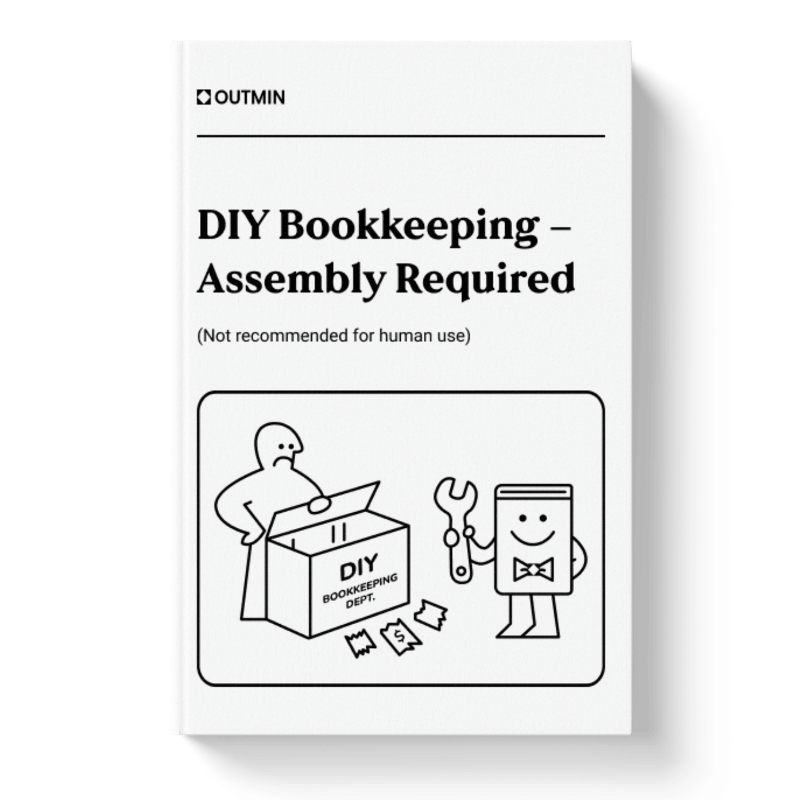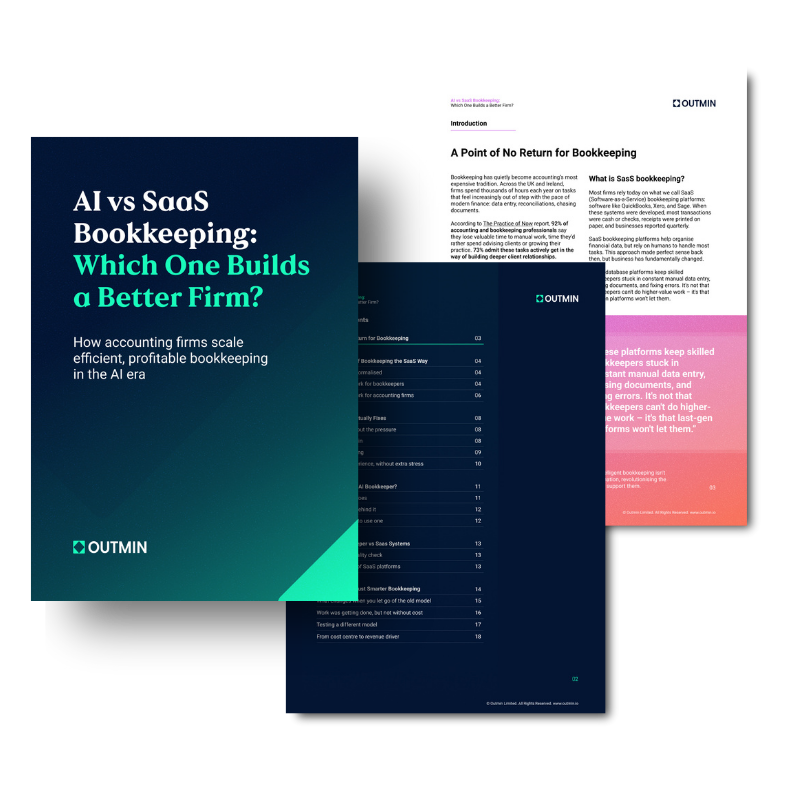June 9, 2025
Why We Built Outmin (And Why Bookkeeping Had to Change)
%20(1).png)
Fresh off closing our €4 million funding round with Feargal O'Rourke – former PwC managing partner – joining as chairman, we've been reflecting on how we got here.
Currency recently covered our journey, but we wanted to share our own perspective on why we decided to tackle bookkeeping in the first place.
It's not exactly the “sexiest” problem in tech. Many founders dream of social networks or the next big consumer app. We chose reconciling bank statements (among a few other things).

The honest answer? We lived the pain firsthand.
Ross, CEO, spent years watching brilliant people waste entire afternoons hunting down missing receipts. Jane, our CTO, came from particle physics at CERN, where massive data processing happens automatically, and wondered why financial data still required so much manual work. David, CRO, was helping startups grow revenue while watching them drown in basic bookkeeping tasks.
The breaking point came when Ross was running operations at his previous company. He'd spend his best hours doing work that added absolutely nothing to the customer experience. "If I really made the best finance function and did the best finance work, it did absolutely nothing to improve our product," he told The Currency. That's when we knew something had to change.
The real problem nobody talks about
Here's what we discovered: the bookkeeping industry has been lying to itself for twenty years.
Everyone talks about "automating bookkeeping," but what they really mean is making humans slightly more efficient. Upload your receipts here. Categorise transactions there. Reconcile accounts manually. Chase missing documents. The software helps, sends you reminders, but you're still doing the work. Pretty much… all of it.
We realised the entire approach was backwards. Instead of making humans better at bookkeeping, we needed to make bookkeeping work without humans (so they can work on higher-value work). That's not just a philosophical difference. It changes everything about how you build the system.
"We displace the bookkeeper," Ross explains. "But then we also displace an array of software packages because ultimately all of those together are corrupting data and slowing down the release of data."
Starting from zero
When we incorporated Outmin in March 2020 (literally days before the world shut down), we made a decision that seemed crazy at the time: we wouldn't build on top of existing accounting platforms. No integrations with Xero. No QuickBooks connectors. We'd start completely fresh.
Why? Because every existing platform was designed around the assumption that humans would do the heavy lifting. Their data structures, their workflows, their entire architecture assumes manual input somewhere in the process.
We wanted to build something that connects directly to the sources of truth. Your bank accounts. Your point-of-sale systems. Your payroll provider. Your suppliers. Then we built AI that can understand and process all of that data automatically.
The result is what we call zero-touch bookkeeping.
“You never need to reconcile anything again,” says Ross. “If you’re missing a document, we resolve it for you. It’s part of the process and service.” When transactions need categorising, it happens instantly. When suppliers need paying, it's handled automatically.
How we actually do it
The technical side is where things get interesting. Most "AI bookkeeping" tools are really just smart categorisation on top of old platforms. We rebuilt everything from the ground up for machine learning.
Our AI maintains continuous reconciliation. Instead of doing monthly closes, it’s constantly processing every transaction as it happens. It learns your business patterns, understands your suppliers, and catches anomalies in real-time.
But here's the crucial part: we still have expert accountants reviewing everything. Not because the AI isn't good enough, but because combining AI precision with human insight gives you something better than either could achieve alone.
The AI handles the boring, repetitive stuff just perfectly. The humans handle the edge cases and provide an extra layer of quality review and accuracy. And the client gets a simple dashboard where they can access daily cash insights and ready-to-view financial reports.
The numbers that tell our story
After five years of building this, the results speak for themselves. We've saved our clients over €10.5 million and reclaimed more than 500,000 hours of admin time.
One of our hospitality clients, Devour Bakery, cut €35,000 from their annual accounting costs. Not by finding a cheaper bookkeeper, but by eliminating most of the bookkeeping work entirely.
Whelan’s, a food manufacturer, is saving 160 hours every month since we started doing the work of two full-time bookkeepers for a fraction of the cost. Xeinadin, an accounting firm working with us, saw their admin hours drop by 93% and bookkeeping costs fall by 25% per client.
These numbers aren't incremental gains. They represent a fundamental shift in how financial operations work.
The pivot that surprised us
We started by selling directly to small businesses, essentially anyone drowning in financial admin. Last year, we focused on the hospitality industry. But something unexpected happened.
Accounting firms started reaching out. They had the same problem, but amplified across dozens or hundreds of clients. Manual bookkeeping processes were capping their growth. They couldn't take on new clients without hiring more people, and good bookkeeping staff are really difficult to find.
"It became apparent that the accounting practices actually had this problem – both the human and the software problem – in a much more pronounced way than the direct businesses," Ross explains.
So we adapted. Now we work with both direct businesses and accounting practices. The underlying technology is the same, but we've built different interfaces for different users.
“We’ve basically built this unified architecture that gives the practice their view of the world and the client their view of the world,” says David.
Here’s what that looks like:

“We’re solving the same problem, whether it’s an accounting practice or in a business, but we’re also repurposing what we built in the previous phase for the direct customers.”, explains Jane.
What comes next
Bookkeeping was just the foundation. What we’re excited about now is what that foundation unlocks.
We’ve built the infrastructure to automate financial data at scale, and once that’s in place, it opens the door to entirely new (and very exciting) capabilities. Things like real-time benchmarking against similar businesses. Predictive cash flow models. Automated compliance reporting. Budgeting tools that adjust themselves based on performance.
These aren’t product announcements – yet. But they’re part of the roadmap we’re building towards.
Ross puts it this way: “If machine learning is the car, data science is the fuel – and the data is broken.” We fixed the data first. Now we get to start imagining what’s possible on top.
For business owners, that could look like managing their finances from their phones: asking questions in plain English and getting instant insights on cash flow, profitability, or supplier payments. For accounting firms, it could mean audit prep that takes minutes instead of hours, or live budgets that clients and advisors can collaborate on together.
“We ultimately do commonwealth bookkeeping today,” Ross explains about our expansion plans. “So if you bring the better product and pricing model to a foreign territory, we like to think that’s going to be a very exciting time.”
To build toward that vision, we’re expanding our engineering team and hiring for key roles. “We’re looking to hire AI engineers… to be building an AI-first product that really realises what’s so powerful about the advances in AI technology today,” says Jane.
Why this matters now
The timing feels right in a way it wouldn’t have five years ago. AI has gotten genuinely good at the kind of pattern recognition and data processing that bookkeeping requires. Cloud infrastructure makes it possible to connect to all the different systems businesses use. Mobile technology means people expect to manage everything from their phones.
But more than that, businesses are desperate for solutions that actually eliminate work rather than just reorganise it. Hiring is expensive. Legacy systems were built for another era. Everyone's looking for ways to do more with less.
The fresh funding and – especially – having someone as experienced as Feargal O’Rourke guiding us are huge, huge wins.
But what continues to move us is the problem we’re solving. We have clients telling us we’ve given them their time back. Accounting firms that can finally focus on advisory work instead of data entry. Business owners who can spend weekends with their families instead of reconciling accounts.
The bigger picture
What we’re really building is the future of business operations. Bookkeeping is just the starting point because it’s foundational. Everything else depends on clean financial data.
But once you can automate financial data processing, you can automate a lot of other business processes too, from compliance reporting to performance analytics.
We also like to make it clear that we’re not trying to replace human judgement or creativity. In fact, we want to create more space for that. We’re trying to eliminate the boring, repetitive work that keeps smart people from doing their best thinking.
The goal isn’t to build just another bookkeeping company. It’s to build the nervous system that lets modern businesses actually work like modern businesses should.
That's why we built Outmin, and this is certainly just the beginning.
If you want to be part of our journey and see Outmin in action, book a free demo with us today.









